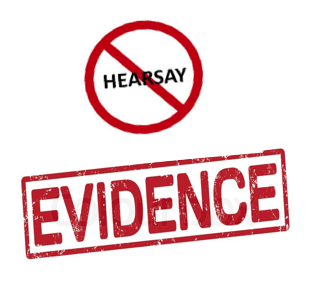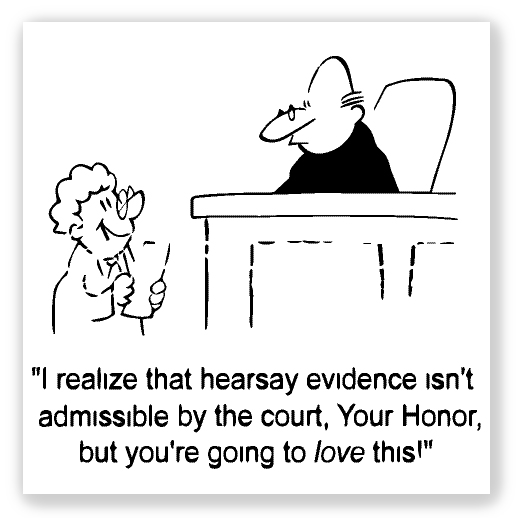We post news and comment on federal criminal justice issues, focused primarily on trial and post-conviction matters, legislative initiatives, and sentencing issues.

(HEAR)SAY WHAT?
 Once a federal prisoner is released, he or she spends a period of several years (on the average) on “supervised release,” under which he or she is supervised by a United States Probation Officer who (often enough) lives to declare that the former prisoner has violated the terms of supervised release and should be sent back to prison. It is not surprising that about one out of three people get “violated” at least once during their terms of supervised release. Not all get sent back to prison, but enough do.
Once a federal prisoner is released, he or she spends a period of several years (on the average) on “supervised release,” under which he or she is supervised by a United States Probation Officer who (often enough) lives to declare that the former prisoner has violated the terms of supervised release and should be sent back to prison. It is not surprising that about one out of three people get “violated” at least once during their terms of supervised release. Not all get sent back to prison, but enough do.
When the former prisoner is declared to have violated supervised release, a hearing is held that seems pretty short on due process guarantees. One of the most pernicious attributes of the hearing (besides the low standard of proof required, a mere 51% “preponderance of the evidence” standard) is hearsay.
Very simply, hearsay is any testimony about a statement made by someone not present in the courtroom introduced to prove the matter asserted. If defendant Larry Lowlife is accused of stealing candy from a baby, a witness’s statement that “my mother told me she saw Mr. Lowlife take the candy bar from the baby would be hearsay” if the statement is intended to prove Larry’s guilt.
Such testimony is generally not admissible, because – at least in criminal trials – it denies a defendant his or her 6th Amendment right to confront witnesses. Maybe Mom was standing 200 yards from Larry and the baby. Maybe Mom stood to make a lot of money writing a book about Larry’s theft. Maybe Mom took the candy, and was trying to deflect blame. If Mom is not present to testify, Larry can’t mount a defense.
 To be sure, there are dozens of exceptions to hearsay, from excited utterances to dying declarations. That’s for law school evidence class. For now, it’s enough to understand that hearsay can be dangerous and that courts have been all too willing to allow it to send people back to prison.
To be sure, there are dozens of exceptions to hearsay, from excited utterances to dying declarations. That’s for law school evidence class. For now, it’s enough to understand that hearsay can be dangerous and that courts have been all too willing to allow it to send people back to prison.
People like Derone Coleman. Derone’s Probation Officer moved to revoke his supervised release after his former squeeze Kippie House complained of a more current “squeeze.” She said Derone “squeezed” her around the neck, choking her, biting her on the face, and pulling a gun on her while reminiscing about their prior relationship.
Kippie’s cousins were present for the alleged assault, giving the government an impressive witness list at Derone’s supervised release violation hearing. But Kippie had moved, and she and her cousin Lashonda made themselves scarce when the PO tried to subpoena them. What’s more, after reporting Derone to the Probation Officer, Kippie declined to press charges locally.
The government told the court that its “efforts to serve” Kippie and Lashonda “have been unsuccessful,” and instead offered three other witnesses, who could only recount what Kippie or Lashonda had told them. Derone objected to the hearsay evidence, arguing that he had a right to confront his accusers. The district court disagreed, holding that the government’s explanation showed there was good cause for House’s absence at the revocation hearing. The district judge had his own doubts about the photo evidence of Kippie’s alleged injuries, but even so he viewed the photos as consistent with what the witnesses said Kippie had told them about the assault.
The district court revoked Derone and gave him 60 months.
Last week, the 8th Circuit reversed. Although at the revocation stage, a defendant has less than the full panoply of protections afforded by the rules of evidence, he or she is still entitled to the “minimum requirements of due process.” Among those requirements is the right to confront and cross-examine adverse witnesses, the 8th said, “unless the hearing officer specifically finds good cause for not allowing confrontation.”
 “In assessing whether a defendant should have been allowed to confront an adverse witness,” the Circuit ruled, “we balance his due process rights against the grounds asserted by the government for not requiring confrontation.’” To show good cause for denying a defendant his confrontation rights, the district court needed to assess the government’s reason for not producing Kippie; and the reliability of the hearsay offered in place of her testimony. “The government needed to show both prongs,” the Circuit said. “A failure under either prong negates good cause.”
“In assessing whether a defendant should have been allowed to confront an adverse witness,” the Circuit ruled, “we balance his due process rights against the grounds asserted by the government for not requiring confrontation.’” To show good cause for denying a defendant his confrontation rights, the district court needed to assess the government’s reason for not producing Kippie; and the reliability of the hearsay offered in place of her testimony. “The government needed to show both prongs,” the Circuit said. “A failure under either prong negates good cause.”
Generally, unless a witness has moved out of state, the government has no excuse for not producing her to testify. Here, the government argued that the Probation Officer had tried to call Kippie without success. The 8th observed, “If we were to adopt the government’s position, then we would effectively equate missed calls to an interstate move.” While witnesses who refuse to testify out of fear have been excused in the past, the Circuit noted, while Kippie “changed her mind about pressing charges… nothing in the record suggests she refused to comply with a subpoena or said that she would not testify.”
Beyond that, the 8th said, the government never established a causal link between the photographic evidence and the hearsay. Derone argued Kippie, as a jilted girlfriend, had a motive to get Derone locked up. The government argued on the other hand that the very fact Kippie refused to press charges meant that she knew her honest testimony would lock up someone she still cared about, and thus her failure to testify actually corroborated her testimony.
The Circuit punted on those arguments, dryly noting that “regardless of the truth of Kippie’s out-of-court allegations, the government needed to offer additional indicia of reliability when a possible motive to implicate Derone indisputably existed.”
The 8th told the district court to cut Derone loose.
United States v. Coleman, Case No 20-2623, 2021 U.S.App. LEXIS 23037 (8th Cir., Aug. 4, 2021)
– Thomas L. Root

